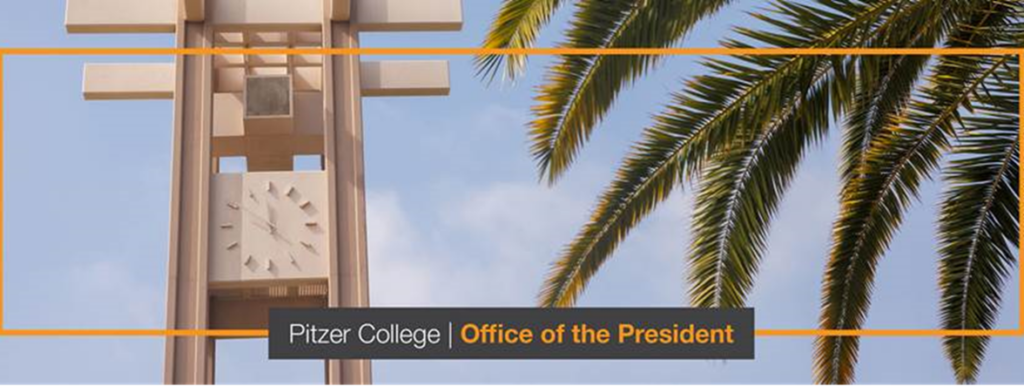
April 11, 2024
Dear Pitzer College Community,
Pitzer stands apart from many colleges and universities in that the meaningful participation of students, faculty, and staff in College governance has existed since our founding and remains a cherished aspect of our community to this day. I have great respect for this model and, as president, I take very seriously my role in this deliberative process.
Over the last several months, I have engaged in multiple discussions with members of our faculty, staff, student leaders, and authors of the Student Senate resolution, formally and informally. I listened respectfully throughout the Student Senate meeting in February and at College Council meetings, including the one today. I share the despair many of you feel from the death and devastation we have witnessed in Gaza and Israel, and I appreciate the anguish that motivates this recommendation for many.
As I shared in mid-February when the Student Senate resolution initially passed, I will not accept recommendations that run contrary to Pitzer’s commitment to academic freedom, to creating a safe and productive learning environment for all, and to the core value of intercultural understanding. I’d like to provide my perspective on the principles that have guided my decision to not accept the College Council’s recommendation.
Academic Freedom
I do not support an academic boycott of any country, as it directly opposes our educational mission and our commitment to academic freedom. A key role of a liberal arts college is to educate students to think critically, listen actively, and develop their own informed views. We must always promote academic freedom, even when it is denied to others. The AAUP (American Association of University Professors) has long advocated against academic boycotts: “We reject proposals that curtail the freedom of teachers and researchers to engage in work with academic colleagues, and we reaffirm the paramount importance of the freest possible international movement of scholars and ideas.” I concur.
Safe and Productive Learning Environment for All
Related to the broader concept of freedom of expression, we must likewise guard against creating the impression that some perspectives are more welcome on campus than others. I believe the College Council recommendation, if accepted, could have such an impact. We will not tolerate anything, including Islamophobia and antisemitism, that threatens our ability to maintain a safe and productive campus learning environment for all.
Every one of our classmates and colleagues deserves an environment where we can engage in constructive dialogue, especially on difficult and sometimes polarizing issues such as the Israeli-Palestinian conflict, without fear of disparagement or social exclusion for expressing a point of view. We should all work to promote inclusivity and constructive dialogues, and always take care not to demean or exclude those with whom we disagree.
Intercultural Understanding
The goals of a Pitzer education include listening to and learning from the lived experiences of others, opening our eyes through different cultural lenses, challenging our own beliefs and points of view, and endeavoring to become more critical thinkers. Rather than closing our minds, our hearts, and our doors, we need to seek out and create more educational opportunities for Pitzer students, not fewer. That commitment has not changed.
What has changed, however, is that we now have in place in our system of shared governance a more rigorous process to ensure that our programs meet our academic and operational standards and provide the best possible learning and growth opportunities for students. Development of a new process to evaluate our international programs began in 2021−22, was completed in 2023−24, and is now codified in Guiding Principles for Opening and Closing Pitzer Approved Study Abroad Programs. The College Council recommendation would undermine this element of our shared academic governance.
The recent decision to remove 11 international programs (from Brazil, Denmark, Finland, Germany, Israel, Singapore, South Korea [2], Sweden, Turkey and the UK) from the pre-approved list was made by the Faculty Executive Committee in April. I wish to reiterate, as stated in communications from the Dean of Faculty, that none of the removals from the pre-approved list, including that of the University of Haifa, were for reasons of academic boycott.
I am committed to expanding opportunities for engagement and intercultural understanding, and I am confident that over time we will identify opportunities to establish new study abroad partnerships around the world.
The College Council voted on the recommendation earlier today, but this topic has been on my mind for many months. I have considered the issues with an open mind, listened actively, engaged in thoughtful and considered discussion, and shown respect throughout. As president, I have made my decision based on the key principles set forth above, which are in the best interests of the College as a whole. I know many will disagree with this decision. I look forward to engaging further in constructive and respectful dialogues in our shared community.
Provida Futuri,
Strom C. Thacker
President